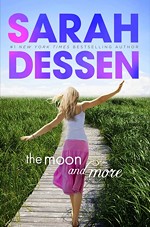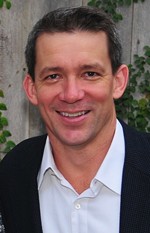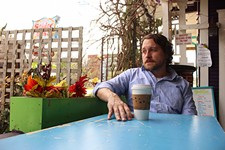Rob Thomas' Unlikely Route to Young Adult Fiction
'Veronica Mars' creator dishes on teens, fans, and the movie
By Amy Gentry, 11:00AM, Thu. Sep. 26, 2013
“My eyebrows have grown in,” Rob Thomas faux-apologizes as the camera clicks.
Just a few days ago he was sitting in a chair, being fussed over by makeup artists during a photo shoot for Entertainment Weekly. “There were people rushing around, and all this food … It was bizarre. This is a lot more painless than the other one. Significantly less pressure.”

Here in Austin, Thomas is on home turf, and the only traces of the Veronica Mars film whose upcoming release keeps him in L.A. five days a week is a framed movie poster leaning against the wall, waiting to be hung. I am not, technically speaking, here to talk to TV and film producer Rob Thomas, but rather to young adult author Rob Thomas, whose incisive, thoughtful coming-of-age novel Rats Saw God came out in 1996 and has recently been rereleased by Simon & Schuster. Compared to a photo shoot for the long-awaited release of the first-ever fan-funded studio film, an adaptation of the original CW television show funded by some 90,000 fans via a $6 million Kickstarter campaign, an interview about his upcoming appearance at the Austin Teen Book Festival does seem rather less daunting.
But film director Rob and YA novelist Rob have more in common than you might think. The eponymous heroine of Veronica Mars and the protagonist of Rats Saw God are both prematurely jaded teenagers who went from being happy, well-adjusted teens to social outcasts and loners. There are distinct differences of genre, of course: Veronica pursues petty criminals and investigates grisly murders, while Steve, a perpetually stoned high school senior, pursues girls and schemes to get into the yearbook by forming an absurdist club (the Grace Order of Dadaists, or GOD for short). Both, however, grapple with the host of betrayals, major and minor, that beset teen life: parental affairs, first break-ups, alienation from friends, and dizzying changes in social status.
Plus, can it be a coincidence that Steve wears a bandana around his head and hoop earrings in both ears, while Veronica’s high school mascot is the Pirates? If only we had a teen sleuth to figure that one out.
Coincidence or no, Thomas' work returns again and again to the themes of young adulthood. Even his grown-up characters, like the maturity-impaired caterers of another of his beloved but short-lived comedy shows, Party Down, often seem stuck in permanent adolescence. In our interview, Thomas spoke at length about what makes high school students interesting, dealing with the fans, and the one TV show that got away.
Austin Chronicle: Tell me about the re-release of Rats Saw God. What’s new with the book since 1996?
Rob Thomas: I’m 20 years older. I should say, I’m 20 years older than when I wrote it in 1994 – I was 28, and I'm 48 now.
AC: Because you have these connections with Austin, San Marcos, and San Antonio, I was a little surprised to see it was set in Houston. As a person who grew up there, I was like, "Fitzgerald’s! Memorial Mustangs!" Where did those details come from?
RT: It’s funny because nowadays I would say, "Oh I must have just gone online and done a bunch of research," but when I wrote that [in 1994], of course, I was not doing that. I had friends from the Houston area that I gleaned some things from. I was told, back when it came out, that Clear Lake High School, the librarian there, they had gone on a quest back through all the old yearbooks to find me, because they assumed I had gone to school there. But I did not.
AC: I had a moment where I thought, "Surely this is based on autobiographical detail."
RT: Not at all, really. I was a high school jock. I went and played football with [Texas Christian University]. But there were a group of students who were a few years older than me, who were seniors when I was a sophomore, who were these very smart and literate guys and girls. They were on the debate team, and they formed a club, the Monty Python Appreciation Society or something, to get into the high school yearbook. So I kind of stole a bit of that. And then my first job post-college was high school journalism teacher in San Antonio. Strangely I ended up with a high school yearbook staff with six National Merit Finalists on it. They were just these smart, underachieving, literate kids. And I liked that group. They were fun to be around. You felt like if you could get them motivated you had really accomplished something. So I probably took snatches of their conversations and turned that into like the group of teenagers that are in the Grace Order of Dadaists.

AC: [Bestselling YA author] Libba Bray told me that Rats Saw God is the novel that converted her to YA. But I’ve seen you say that when you wrote it, you weren't writing for a YA audience.
RT: Right. I didn't have a real good conception of what the boundaries of young adult fiction were. I was 28 writing about an 18-year-old, but I wanted to write it for an audience of my peers. I didn't think, "I'm going to go hand this to teenagers." I live in Austin, I'm playing in a band, I want to show my musician friends this and see if they dig it. That was my target audience. That taught me a really valuable lesson. When Simon & Schuster bought it as a young adult novel, and when it was well received, I thought, "Well, here's the key to writing for young adults: Don't think about it. Just write what entertains you." If you like it, they’ll like it. And don't talk down to them. Never ask yourself, "What are the kids thinking these days?"
AC: You do have this thread of young adult experience in your work, if you count in a certain TV show that people got very excited about. What is it about teenage experience that appeals to you or compels you?
RT: I don't know. I’ve wondered that. I'm still attracted to it. I hear there's a good teen movie out, I'm excited about it. I still respond. I'm a couple years from 50 and I still want to see that movie. My dad was a high school coach turned principal; my mom was a high school drama teacher; I taught high school. I don't know if we all have arrested development, but … I like teenagers, I think they're interesting. I think it's a period in your life where everything is high drama. You don't have to have true life-and-death situations to play as high drama.
AC: You were a jock in high school, but then you left TCU for UT. Were you ever a disaffected teen?
RT: Yeah, but I didn't become disaffected until I was 19. I was a fairly all-American jock high school boy with slight hints of… I dug Elvis Costello, some stuff like that. But when I got to TCU, most of the football players were on the first floor of the athletic dorm, and I was on the third floor with all the misfits – the tennis players and the soccer players and swimmers – and it was a much more eclectic group. We started going to Dallas and hanging out in the Deep Ellum clubs, and I had my mind expanded. [laughs] By the end I had grown my hair very long and shaved it in strange places and dyed it odd colors. By the time I left TCU, I had quit football, and I was the editor of the magazine there, and I really felt like, ‘I stand out here in my weird thrift store clothing and my terrible haircut.’ And then I transferred to UT and looked around, and said, ‘Oh, and now I'm normal again. I'm right back.’
AC: What did your family think of this?
RT: My dad said, "Please, no earring." And I gave him that. I can't even say I was ever that tempted … But it was really my dad who, in my mid-20s, convinced me I needed to write. I was teaching high school, and he said, "You need to do what you can to just write."
AC: Had you wanted to write before then?
RT: My whole life. I told my junior high counselor that I was going to be a writer, and to me that meant writing books. I think that just got beaten out of me – you know, in high school I thought, "No one I know writes books for a living. I'll be a reporter; I'll be a journalist." I was editor of my high school paper then went into journalism in college, and was either going to write for Rolling Stone or Sports Illustrated – my two big loves. And then I started playing in a band, and then those were the years of "I want to be Elvis Costello; I want to be Pete Townsend; I want to write great lyrics." I was an incredibly mediocre musician, which really held me back.
AC: Thank god! On behalf of Veronica Mars fans. It strikes me that's a big theme in Veronica Mars, going from the popular crowd to the disaffected loner outsider. Do you think that's a theme that came from your life?
RT: Yeah, but you know, going disaffected at 19 is such a different thing. Because it's not uncool then. To start hanging out at hip Deep Ellum bars, it’s not like, "Oh, I'm an outcast." It was a very hipster-y thing to do. But I will say that I moved to Texas in fifth grade and ended up going to four schools in three years, in these very difficult years. First I moved from a small farming town in Washington over to East Austin. I went from Norman Rockwell America to a cultural melting pot. My dad at that time was vice principal of Westlake High School, and I was having trouble, so he took me up there, and that was its own weird culture shock. That felt, even though I don't know that this term existed at the time, like John Hughes High. I was supremely unpopular there. I was a totally brainy geek kid even though I'm not particularly brainy. So yeah, I went through outsider-y, geeky, uncomfortable feelings in those junior high years, and sports kind of rescued me from that. But those years gave me soul, is what I'm trying to say. [laughs]

AC: What is it about Veronica Mars? You've done a lot of other awesome stuff that people love, but Veronica Mars is different. Why?
RT: Teenage years are hard. And, having taught high school for a number of years, I think they're particularly hard on teenage girls. The most self-conscious human beings on the planet are teenage girls. And I think Veronica, because she'd been through the muck, she came out on the other side this very strong character who was able to say what she meant. There are other strong female characters – Buffy was a strong young female character, and Jennifer Garner on Alias. But they were all kind of superhero-y. They had powers. Veronica just had a quick wit and the willingness to say shit. And I think that's what people responded to, was her ability to be self-possessed, and to not back down, to truly not care what other people think. That is the toughest thing to do when you are 15 or 16 years old.
AC: Veronica Mars meant a lot to me at a certain point in time, and then the heartbreak of hearing about the film – like, is this ever going to happen? I'm sure it must have been like that for you, at times.
RT: There was no winning for me. I tried – there were periods where I felt like, "Warner Bros. is on the cusp; let's rally, fans!" And then times when I felt, "This will never happen and I don't want to raise anyone’s expectations," so I tried to tamp down expectations. I can remember seeing articles online: “Will Rob Thomas please shut up about the Veronica Mars movie?” Yet invariably, I don't know if there was one interview, if I've been interviewed a hundred times in the last 10 years, if I didn't get asked about a Veronica Mars movie in any one of them. It was always a question. Which is strange for a low-rated show that was canceled in year three. Just depending on where my career was, there were times when I was trying very actively to make it happen, and times when I was bummed and didn't think it could. And the thing about the Kickstarter campaign is, had we failed… The one upside I saw to it is, it will put it to bed. One way or the other, success or failure, this can now have an ending to the story.
AC: And now you’re being dragged through the final chapter. It’s not over.
RT: It’s a lengthy process.
AC: You talk about girls and adolescence. You have a daughter who's 8. Do you worry about her going into this mess?
RT: I’m not worried yet. It feels like too early to worry about that. It's funny, Enrico Colantoni [who played Veronica's father, Keith Mars] and I have had this conversation, because he has a teenage girl now. He says it's the weirdest thing. His daughter was a little girl when we did the show, but now she's a teenager, and she’s watching the show. And he says he feels her watching him as dad on the show, and then turning to him in real life and thinking, "What a disappointment!" And I have felt that a bit as well. I am so proud of that father-daughter relationship that I have written on the screen; I hope I have that with my daughter. It’s funny, I always, as a high school teacher and particularly as a high school yearbook teacher, because yearbook staffs are 90 percent female, I got to sit in and overhear teenage girl talk for many years. I like teenage girls; I like their drama, their foibles. And I think, "I'll be good with a teenage daughter!" And yet who knows? Maybe I'll get to that and be just, "Quit being moody! Smile!"
AC: How do you get your ideas?
RT: All over the place. I have been really looking for stuff that I can do in Texas. I don't want to have to be on a plane every week. When I moved back to Austin nearly four years ago, I came back believing I was going to do a show about the Austin music scene. I had Party Down on Starz, and I had a great relationship with the Starz execs. I had written a pilot for them that they were very excited about, we had done a budget on it. And then the head of Starz left, they brought in a new guy who’d come in from HBO who didn't know me, and who just saw this low-rated comedy. And suddenly not only was Party Down dead, but my show about the Austin music scene was dead. And that was the one I was dying to write. In the world of write-what-you-know, I know a whole lot about being in an unsuccessful Austin rock band.
AC: That’s such a great idea.
RT: That one hurts me. There are some scripts that I look back and think, "Ugh, that was a whore gig, Rob." That one was a passion project. That one hurts a bit, when I look back.
AC: Why hasn’t Dazed and Confused been made into some kind of TV series? It just makes sense.
RT: I couldn't love a movie much more than Dazed and Confused. I would argue that Dazed and Confused: The Series would have been very much like Freaks and Geeks. And that died a painful death because it was too good.
AC: That hurt.
RT: Well, in a weird way, Veronica Mars was my reaction to Freaks and Geeks, because Freaks and Geeks was the show I wanted to write, the one I wanted to create, where there was no gimmick; you didn't have to have a teenage private eye. It was just these beautiful small stories about real kids. When that died, I said, "Hey, if you want to get a teen show on the air, it needs to be case-driven; you need to have a hook. It needs to be more Buffy than Freaks and Geeks. Veronica Mars was my trick to get a teen show on the air.
AC: Let’s talk about fan interactions, which have been so vital for Veronica Mars, not just for the Kickstarter, but from the very beginning, especially in your relationship with [internet fan site] Television Without Pity.
RT: It was brand new. Now interaction between showrunners and fans seems commonplace, and showrunners can tweet. But Television Without Pity, we were three or four episodes into Veronica Mars when someone brought it in and showed me the website, and it was great on all sorts of levels. Because we weren't doing great numbers, but it made us feel good, all the writers. It matters, people are noticing – it felt very good. And particularly on a show where we're doing a long arc mystery a 22-episode mystery, the ability to know what fans were thinking – what clues are they buying, what story lines are they into, what do they hate? – it was like having a really intense focus group. But it's such a dangerous… I say "monster," but I don't mean that. I love those fans, but I would never want to do more than dip my toe in the water, because I don't think you want to do a TV show as a democracy. Like, hey, what do you all vote for? A choose-your-own-adventure. You have to be willing to anger them from time to time. But it continues to be great. I got a ton of face-to-face time with really intense Veronica Mars fans who signed up for the “be-an-extra” level of the Kickstarter campaign. Those were some die-hard fans. And they were great, they were so fun on set. Usually you're working with extras who are getting paid to be there, who … they’re not dialing up the energy on the set. To suddenly look around and there are 50 people who are just wired? Those were great days on the set.
AC: What has enraged fans?
RT: Oh, you know [Veronica's season-three love interest] Chris Lowell? – say, having him in the show at all. I don't know that anyone who comes between what people view as the ultimate Veronica-Logan thing can survive that. I keep looking at Chris Lowell, thinking, "What a charming, great guy! Every college girl's dream boyfriend!" He's adorable and sweet and attentive and not a horndog, and why does he get pilloried? An early shot from the set showed Chris Lowell and Kristen [Bell] together, and – rage, rage!
AC: You have Jason Dohring [the actor who portrays Logan Echolls] to blame for that.
RT: You should see Jason Dohring – he looks like Ryan Gosling now. He must be 4, 5 percent body fat. Had I known, he wouldn't have worn a shirt in the movie.
Rob Thomas speaks at the Austin Teen Book Festival this Saturday, Sept. 28, along with Sarah Dessen. Read our interview with Dessen here, and check out more about the ATBF here.
A note to readers: Bold and uncensored, The Austin Chronicle has been Austin’s independent news source for over 40 years, expressing the community’s political and environmental concerns and supporting its active cultural scene. Now more than ever, we need your support to continue supplying Austin with independent, free press. If real news is important to you, please consider making a donation of $5, $10 or whatever you can afford, to help keep our journalism on stands.
Amy Gentry, Sept. 26, 2013
Monica Riese, May 8, 2013
Austin Teen Book Festival, Rob Thomas, Veronica Mars, Rats Saw God, young adult fiction, YA, Kristen Bell, Kickstarter, Jason Dohring, Dazed and Confused, Freaks and Geeks, Party Down










